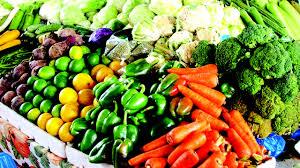Youth agriculture entrepreneurs (agripreneurs) have called on African governments and stakeholders to invest in local produce to improve nutritional integrity and contribute to the value chain in the sector.
The agripreneurs made the call at the fourth African Development Bank (AfDB) African Youth Agripreneur Forum (AYAF) held virtually in Abidjan, Cote d’Ivoire and presented by the Enable Youth programme.
The webinar was the second of the three-part webinar series and had as its theme: “Empowering Youth and Women in Agricultural Value Chains to Address Nutrition”.
The second session was aimed at identifying options and strategies for incorporating nutrition into the agribusiness value chain to address poor nutrition.
This would be done while providing and creating new opportunities for the economic and social empowerment of women and youth in the agricultural value chain and agribusiness space.
Mrs Boitshepo Giyose, Special Advisor to the Chief Executive Officer (CEO), African Union Development Agency and New Partnership for Africa’s Development (AUDA-NEPAD), said nutrition was not the concern of the agriculture sector alone.
Giyose, also a Senior Nutrition Officer, Food and Agriculture Organisation, said every sector had a role to play in terms of productivity and ensuring the nutritional value of local produce.
“We do know that nutrition has never been the purview of one sector, it is interdisciplinary, requiring all key sectors to play their role. However, if national governments do not recognise the importance of investing in nutrition, then they have missed the mark because without good nutrition you cannot have good social economic development.”
She said African governments needed to develop food industries to process, add nutritional value, minimise nutritional loss and ensure the promotion of consumer demand for nutritious food.
She also called on Africans to promote, protect and preserve the continent’s biodiversity “and shining more light on the traditional, indigenous and neglected species”.
Biodiversity refers to the variety of plant and animal life in the world or in a particular habitat, a high level of which is usually considered to be important and desirable.
Giyose added that there was also the need for Africans to understand their culture so as not to continually rely on “others to feed us with things that are not nutritious but out of convenience to enrich themselves”.
“They do this without thinking about the nutrition, livelihoods and sustainability of the African consumer”.
She also reiterated the need for governments to put policies in place that would readily attract the youths “so they see agriculture as something that can bring about livelihood, strong economic standing and make agriculture look sexier than ever”.
However, Mr Thione Niang, the Chief Executive Officer (CEO) and Founder, Jeuf Zone Farm said the youth needed to drive the change in the continent and not rely on the government or foreigners.
Niang said youths in the Diaspora should invest “especially in agriculture” to promote job creation in the agriculture value chain.
“Africa is supposed to feed the world but the reverse is the case, we really have to get involved to make sure we feed our own people. There is a huge impact to be made through farming, we can change the story through farming and make rural areas attractive”.
Furthermore, Eleonore Kouakou, Specialist Women Economic Empowerment, UN Women emphasised the need for women to be included in agriculture value chains in terms of access to lands and agriculture resources.
Kouakou said the strategies in the UN could be adopted by African governments.
“We do believe that it is important to build the agricultural and technical capacities of women so they are able to have access to economic resources and create enterprises in order to make sure they are able to break the poverty cycle”.
Ms. Siny Samba, the Cofounder and CEO, Le Lionceau said women and young agriculturists had a role to play in infant nutrition with regard to the local produce.
“I think we also need to sensitise or create some awareness vis-à-vis the local products. It is very important for us to have the best practices for our food in order to minimise the health issues”.
The programme has as its theme: “Driving Sustainable Nutrition and Gender Inclusivity in Africa’s Agri-Food Systems: Youth Agripreneurs Seize the Decade”.

